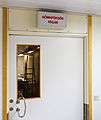Sleep disorder facts for kids
A sleep disorder is a problem that makes it hard for people to sleep well. This can mean they don't get enough sleep, sleep at the wrong times, or do unusual things while sleeping. There are many types of sleep disorders, and some can be quite serious.
Contents
Types of Sleep Problems
Sleep disorders can be put into different groups:
- Dysomnias are problems that cause people to sleep too much or too little. Some of these come from inside the body, like insomnia (trouble falling or staying asleep) and narcolepsy (sudden sleep attacks). Others can be caused by outside factors.
- Circadian rhythm sleep disorders happen when a person's body clock is out of sync with the normal day-night cycle. This means they might sleep at unusual times, like very early or very late. They can often get enough sleep, but it's at the "wrong" time of day.
- Parasomnias are unusual actions that happen while a person is asleep, and they usually don't remember doing them. Examples include walking, eating, or even dressing while still asleep.
- Medical or psychiatric disorders can also make it hard to sleep. For example, people with certain illnesses or conditions might have trouble getting good sleep.
(It's good to know that Sleeping sickness, which is a disease spread by the Tsetse fly, is not considered a sleep disorder.)
Common Sleep Disorders
Here are some of the most common sleep problems:
- Bruxism: This is when someone grinds or clenches their teeth while sleeping.
- Delayed Sleep Phase Syndrome (DSPS): A circadian rhythm disorder where a person falls asleep and wakes up much later than most people. They usually sleep well once they fall asleep.
- Hypopnea Syndrome: This means breathing becomes very shallow or slow during sleep.
- Narcolepsy: People with narcolepsy suddenly fall asleep without meaning to, even when they should be awake.
- Night terror disorder: This causes a sudden awakening from sleep, often with feelings of strong fear or terror.
- Periodic Limb Movement Disorder (PLMD): This causes sudden, uncontrolled movements of the arms or legs during sleep, like kicking.
- Primary Insomnia: This is when someone has trouble falling asleep or staying asleep, and it's not caused by another health problem.
- Rapid Eye Movement Behavior Disorder (RBD): People with RBD act out their dreams, sometimes violently, during the "dream sleep" stage.
- Restless legs syndrome (RLS): This causes a strong urge to move the legs, often with uncomfortable feelings. People with RLS often have PLMD too.
- Shift Work Sleep Disorder (SWSD): This affects people who work unusual hours, like night shifts, making it hard for them to sleep when they need to.
- Sleep apnea (obstructive type): This often causes loud snoring and sudden awakenings when breathing stops for a short time.
- Sleep paralysis: This is a temporary feeling of being unable to move right before falling asleep or after waking up. It can sometimes involve seeing or hearing things that aren't there.
- Sleepwalking: This is when a person walks around or does other activities while still asleep.
What Causes Sleep Problems?
Many things can cause sleep disorders. Changes in daily life, like working different shifts or traveling across many time zones, can affect sleep.
Other things that can lead to sleep problems include:
- Anxiety or worry
- Pain
- Loud noise in the environment
- Certain medicines
- Imbalances in hormones
- Problems with the body's natural sleep-wake cycle
Getting Help for Sleep Problems
If someone snores a lot and feels sleepy during the day, it's a good idea to talk to a doctor about sleep problems.
A doctor might suggest keeping a sleep diary. This is a log where you write down your sleep habits. It helps doctors understand the problem and see if treatments are working.
If someone has ongoing pain, both the pain and the sleep problems should be treated. Pain can make it hard to sleep, and not sleeping well can make pain worse.
The best way to treat a sleep disorder depends on the person's specific problem, their health history, and what kind of treatment they prefer. Some medicines can help quickly. However, changing sleep habits and behaviors can often lead to longer-lasting results for problems like insomnia.
Images for kids
See also
 In Spanish: Trastorno del sueño para niños
In Spanish: Trastorno del sueño para niños
 | Isaac Myers |
 | D. Hamilton Jackson |
 | A. Philip Randolph |


